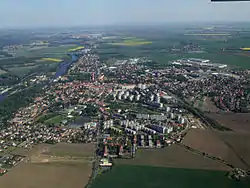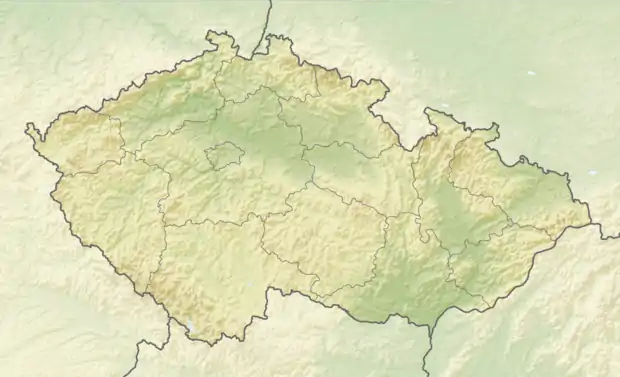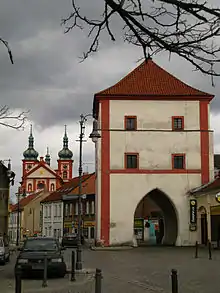Brandýs nad Labem-Stará Boleslav
Brandýs nad Labem-Stará Boleslav (Czech pronunciation: [ˈbrandiːs ˈnad labɛm ˈstaraː ˈbolɛslaf]; German: Brandeis-Altbunzlau) is an administratively united pair of towns in the Central Bohemian Region of the Czech Republic. It has about 19,000 inhabitants and it is the second largest Czech united pair of towns after Frýdek-Místek. Historic centres of both Brandýs nad Labem and Stará Boleslav are well preserved and are protected by law as urban monument zones.
Brandýs nad Labem-Stará Boleslav | |
|---|---|
Town | |
 Aerial view of Brandýs nad Labem | |
 Coat of arms | |
 Brandýs nad Labem-Stará Boleslav Location in the Czech Republic | |
| Coordinates: 50°11′22″N 14°40′2″E | |
| Country | |
| Region | Central Bohemian |
| District | Prague-East |
| First mentioned | 935 |
| Towns joined | 1960 |
| Government | |
| • Mayor | Vlastimil Picek |
| Area | |
| • Total | 22.65 km2 (8.75 sq mi) |
| Elevation | 169 m (554 ft) |
| Population (2020-01-01[1]) | |
| • Total | 19,255 |
| • Density | 850/km2 (2,200/sq mi) |
| Time zone | UTC+1 (CET) |
| • Summer (DST) | UTC+2 (CEST) |
| Postal code | 250 01 |
| Website | brandysko |
Administrative parts
The municipality is made up of towns of Brandýs nad Labem and Stará Boleslav and a village of Popovice.
Geography
Brandýs nad Labem-Stará Boleslav lies in the heart of the agricultural region of Polabí, about 25 km northeast from Prague. It is part of the Prague metropolitan area. It lies upon the Elbe river, Brandýs nad Labem on the left bank and Stará Boleslav on the right bank. The Proboštovský Pond lies in the municipal area.
History
Brandýs nad Labem dates its origin to the 13th century. The town was originally named as Boleslav by Boleslaus I who built here his castle in the beginning of the 10th century.
Stará Boleslav is a historical town and the oldest pilgrimage site in Central Bohemia. It was an early Přemyslid dynasty stronghold built in the late 9th and 10th century and surrounded by stone ramparts. Its fame came from a major historical event: the murder of Duke Wenceslaus by his brother Boleslaus at the gate of St Cosmas and Damian Church on 28 September 935 (or 929). After his death, Wenceslaus was proclaimed a saint by the church and became the patron saint of the Czech nation as well as a symbol of moral reinforcement during hard times.
After 1039, Bretislaus I established a new Romanesque basilica dedicated to St. Wenceslaus (consecrated in 1046 by the Prague bishop) at the site of the murder and pilgrimage site. Moreover, Bretislaus I had the Collegiate Chapter of St Cosmas and Damian, the oldest in Bohemia, built next to the basilica. By the end of the 11th century, the adjoining Romanesque St. Clement Chapel was built. It is valuable for its Romanesque frescos from the latter half of the 12th century depicting scenes from St. Clement's life and martyrdom.
In 1310 Bohemia fell under the House of Luxemburg and subsequently the Habsburgs. Holy Roman Emperor Charles IV visited the town in the 14th century, supported the Chapter, and had new ramparts built.
The Hussite Wars starting in 1420 represented the beginning of the town's decline. Most of the buildings, including the Chapter house and the churches, were burned down, and the Chapter fled to Zittau.

In the late 16th and early 17th centuries, Boleslav regained its earlier fame through the cult of Madonna. In 1617–1625 the new baroque Church of the Assumption of the Virgin Mary was built by Jacoppo de Vaccani, containing a relief of the Madonna called the Palladium of the Czech Lands.
In 1960, the two adjacent towns were joined to form one town of Brandýs nad Labem-Stará Boleslav, after both cities refused to give up their names and accept a new one.[2]
Religion
In 2003, the St. Wenceslaus National Pilgrimage to Stará Boleslav was renewed and is now the largest official celebration of St. Wenceslaus Day (28 September, Czech Statehood Day). On this occasion Pope Benedict XVI visited the St. Wenceslaus Basilica and held mass for over 50,000 people who had gathered in Stará Boleslav.
According to an article in Le Monde, the town is one of the least religious in all of the Czech Republic, and indeed of all of Europe and the world. Communists tried to repress the Catholic religion from the 1950s to the 1980s, something which continues to have profound effects on contemporary life in the town.[3]
Trivia
The name of municipality is the second longest in the Czech Republic (after Nová Ves u Nového Města na Moravě) with 32 letters and spaces.[4]
Twin towns – sister cities
Brandýs nad Labem-Stará Boleslav is twinned with:[5]
 Dunaivtsi, Ukraine
Dunaivtsi, Ukraine Gödöllő, Hungary
Gödöllő, Hungary Montescudaio, Italy
Montescudaio, Italy
Gallery
 Medieval tower in Stará Boleslav
Medieval tower in Stará Boleslav Centre of Stará Boleslav
Centre of Stará Boleslav St. Wenceslaus Basilica in Stará Boleslav
St. Wenceslaus Basilica in Stará Boleslav
References
- "Population of Municipalities – 1 January 2020". Czech Statistical Office. 2020-04-30.
- "Historie" (in Czech). Město Brandýs nad Labem-Stará Boleslav. Retrieved 2021-01-05.
- "La République tchèque, marquée par l'athéisme, se prépare à la visite du pape". Le Monde (in French). 25 September 2009. Retrieved 21 January 2014.
- "Zajímavosti názvů obcí v České republice" (in Czech). Czech Statistical Office. Retrieved 2021-01-05.
- "Partnerská města" (in Czech). Město Brandýs nad Labem-Stará Boleslav. Retrieved 2020-06-30.
External links
 Media related to Brandýs nad Labem-Stará Boleslav at Wikimedia Commons
Media related to Brandýs nad Labem-Stará Boleslav at Wikimedia Commons- Municipal website
- Place of pilgrimage